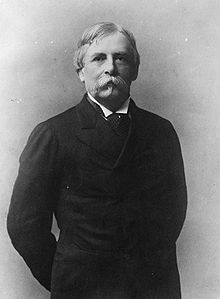William Crowninshield Endicott
| William Crowninshield Endicott | |
|---|---|
 |
|
| 36th United States Secretary of War | |
|
In office March 5, 1885 – March 5, 1889 |
|
| President | Grover Cleveland |
| Preceded by | Robert Todd Lincoln |
| Succeeded by | Redfield Proctor |
| Personal details | |
| Born |
November 19, 1826 Salem, Massachusetts, U.S. |
| Died | May 6, 1900 (aged 73) Boston, Massachusetts, U.S. |
| Political party | Democratic |
| Spouse(s) | Ellen Peabody |
| Alma mater | Harvard University |
| Profession | Lawyer |
William Crowninshield Endicott (November 19, 1826 – May 6, 1900) was an American politician and Secretary of War in the first administration of President Grover Cleveland.
William Crowninshield Endicott, son of William Putnam Endicott and Mary (Crowninshield) Endicott, was born in Salem, Massachusetts. He graduated from Harvard University in 1847 and attended Harvard Law School in 1849–1850, prior to his admission to the Massachusetts bar in 1850. He married Ellen Peabody, daughter of George and Clarissa Peabody of Salem on December 13, 1859, in Salem. Her grandfather was the distinguished Salem ship owner, Joseph Peabody, who made a fortune importing pepper from Sumatra and was one of the wealthiest men in the United States at the time of his death in 1900. They had two children.
He was elected a member of the American Antiquarian Society in 1862.
Following an unsuccessful run for Congress in 1879, Endicott served on the Massachusetts Supreme Judicial Court until 1882. After an unsuccessful gubernatorial race in 1884, he was appointed Secretary of War. He served in that capacity in the administration of Grover Cleveland between 1885 and 1889. Endicott oversaw many important changes in the organization of the United States Army, including the establishment of a system of examinations to determine the promotion of officers.
Endicott convened and chaired the Board of Fortifications in 1885 (usually called the Endicott Board), which would provide detailed recommendations and designs for the generation of American coastal defense fortifications constructed in the era of the Spanish–American War. Most of these Endicott Period fortifications served through early World War II.
...
Wikipedia
